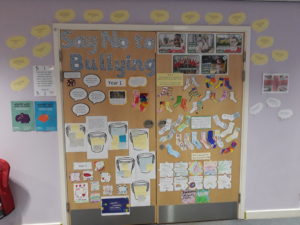Anti Bullying Ambassadors
2020

2019

‘The United Nations Convention for the Rights of the Child applies to every child without discrimination, whatever their ethnicity, sex, religion, language, abilities…whatever they think or say, whatever their family background.’ Article 2.
As a Rights Respecting School we know that all people need to be treated with respect and that we should care for others. Differences are to be celebrated and we know we are treated with equality. We all know bullying will not be accepted at our school.
Our Anti-bullying Ambassadors work regularly with Mrs Coysh, our school PSHE and Anti-Bullying Lead teacher. They have an active role in spreading the word about bullying to the whole school by taking part in assemblies, supporting their peers to follow the anti-bullying policy and during conflict resolution and meeting with the governing body where appropriate.
Anti-Bullying Week takes place in the Autumn term each year. It shines a spotlight on bullying and encourages all children, teachers and parents to take action against bullying. The messages learnt are then reinforced through regular classroom practice, PSHE lessons and assemblies throughout the year.
Aims
We want to:
- empower children and young people to celebrate what makes them, and others, unique;
- help children and young people understand how important it is that every child feels valued and included in school, able to be themselves, without fear of bullying;
- encourage parents and carers to work with their school and talk to their children about bullying, difference and equality;
- enable teachers and other children’s workforce professionals to celebrate what makes us ‘all different, all equal’ and celebrate difference and equality.
- encouraging them to take individual and collective action to prevent bullying, creating safe environments where children can be themselves.
What is Bullying?
In our school a bully is someone who hurts someone on purpose again and again, by using behaviour which is meant to hurt, frighten or upset. We explain to the children using the easy to remember acronym STOP:
Several Times On Purpose
We promise to always treat bullying seriously.
Bullying is:
- Deliberate – intention to hurt or humiliate
- Hurtful – behaviour with no attempt to say sorry
- Repeated – usually ongoing & not just a one-off incident
- Imbalance of power – it’s hard for the person being bullied to defend themselves or make the bullying stop.
The different types of bullying are outlined below:
- Emotional – Hurting people’s feelings, leaving you out.
- Verbal or Written – teasing, name calling, using racist, sexist, homophobic, transphobic or ableist language.
- Physical – Punching, kicking, spitting, hitting and pushing.
- Cyber – Saying and sharing unkind things using texts, email or on social media platforms or games.
Websites
Here are a few websites which you and your children might find useful:
